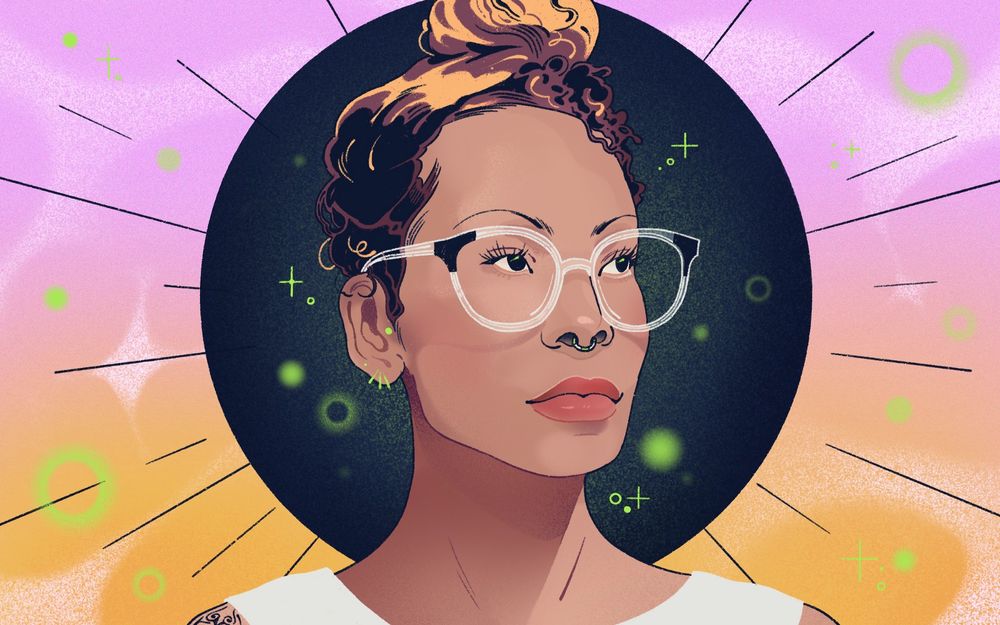Jenna Wortham is active. Dishes and pots clang in the background, and she makes no apologies about what will be a noisy chat. “I just process better when I’m moving around,” she says.
It’s hard not to imagine the Virginia native’s kitchen as a culinary counterpart to her geek-chic style: stylish but accessible. Maybe some vintage cookware to go along with her textured curls and funky pastel frames.
Wortham, 37, is a culture writer for the New York Times, where she co-hosts the paper’s podcast Still Processing alongside film critic Wesley Morris, unpacking everything from cancel culture and stand-up comedy to the 20th anniversary of Fight Club. Her approach to both writing and podcasting is singular — she’s approachable and doesn’t take herself or her topics too seriously. Wortham’s comfort with herself, and the world she inhabits, makes her work feel like a dialogue instead of a diatribe. In between clangs and hops, she shared her innermost thoughts on being a member of queer nation, how she splurged on Black Friday, and her biggest flex of 2019 — even if she wasn’t awake when it happened.
Level: You wrote for Wired before going to the New York Times. How do you know when it’s time to disconnect?
Jenna Wortham: When I was a young reporter covering the tech world, it was hard times. I didn’t have a traditional journalism background, so I felt like I had to compensate and overworked myself. I was having a hard time sleeping, started having panic attacks. I didn’t know what was happening. I was overeating and overdrinking. I didn’t really know how to cope. I started taking Lexapro, which is an anti-anxiety medication. It really came out of a place of urgency and emergency. Once I had that solid foundation in place, I started to understand that my body’s relationship to nutrition and exercise fundamentally gave me a baseline for how I was feeling on a day-to-day basis.
What’s happening this year that is a flex for you?
I’m writing a book called Black Futures with Kimberly Drew. It’s loosely based on a project of Toni Morrison’s called The Black Book; she edited an anthology that was kind of a scrapbook. The best way to describe it is a visual anthology that’s trying to understand something about this moment in Blackness and Black culture and Black cultural production. There is a manifesto on clean water from Latoya Ruby Frazier and recipes by chefs who are trying to embody their lineage and pass it along to us. Wesley wrote an essay for us on the portraits of the Obamas that are in the Smithsonian and what it means that they are there. It’s just one book, and it’s already over 400 pages. I think it will surprise people. The idea is just really creating an archive that we have some kind of control over.
When and where are you most yourself?
On the podcast Still Processing. We are queer, and we are Black, and it just naturally aligned that way — it’s not like that was in the manifesto of the show; it just became what’s most interesting to us. It’s honestly just the stuff we have the most fun talking to each other about. And it allows us to show up more fully in the world and our jobs as well. That’s informing the show topics, too, like how are we growing as people?
Fill in the blank: “Cancel culture is _____________.”
Useful! I just think we have to interrogate what we’re trying to do. I think the internet has given us tremendous power and also the impression that we have tremendous power. Figuring out the difference between those two things is really on us.
What’s interesting too is restorative culture: Rehabilitation is something I’m always interested in when it’s applicable. I don’t think it always works, but I think it’s really interesting, and I love hearing how we’re trying to come up with collective tools and ideologies. I hope it keeps evolving and shifting, because I think it highlights a very real need and a very real desire for structural change. And this is just one way that we’re chipping away at it.
What podcasts should we be listening to? Other than yours, of course.
I love On Being With Krista Tippett. I love Tara Brach, too — they’re my White lady gurus. My friends make a show called Keep It that I really love. Same with Food for Thought. Also Adulting, a comedy pod. Also Inner Hoe Uprising.
What can’t you live without?
Oh my god, my Sonos system. I listen to music 24 hours a day. I listen to music from the time I get up to the time I go to bed. It changes throughout the day. It changes depending on what part of my apartment I’m in. I used my credit card points to go ham on Cyber Monday, and I’m so happy about it.
We’re trying to teach the LEVEL man to get better at self-care. Where do we begin?
Take a bath with Epsom salts. I have a lot of chronic pain from waitressing and years of manual labor, so I take baths all the time — and I love grocery store over-the-counter Epsom salts.
We’re now fully into the new year. What was your biggest flex in 2019?
I went to Bermuda for the Emancipation Day celebration. Essentially, the flex was being on a boat with hundreds of Black people. It was one of the most incredible experiences of my life; it completely changed my hopes in the world. But I think the biggest flex for me is that I’ve been consistently getting eight hours of sleep a night. Like, that’s huge. That’s brand new for me.
And finally, you are LEVEL’s very first Incoming subject. Who should we reach out to next? Who’s someone every LEVEL man should know?
Nina Chanel Abney! She’s a tremendous fine artist and does tremendous work.
